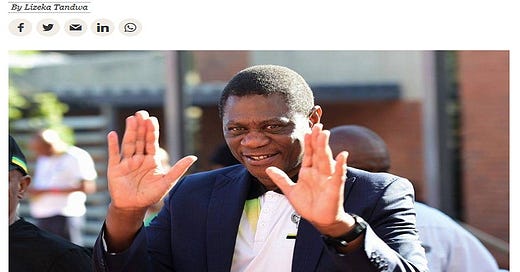None of this bodes well for bilateral ties with Russia or BRICS’ unity.
The Mail & Guardian published a very interesting interview with South African Deputy President Paul Mashatile on Wednesday in which he candidly talked about his country’s upcoming dilemma over President Putin’s planned attendance at next month’s BRICS Summit in spite of the ICC’s arrest warrant. He revealed that the issue is of such importance that he speaks with President Cyril Ramaphosa about it “almost daily” but the emerging consensus in his government is for the Russian leader to not visit.
In his words, “The president has been in discussion with President Putin and advised that he should delegate, preferably his foreign minister. The Russians are not happy with that, they want their whole delegation to come led by him. Those discussions are continuing.” Mashatile also confirmed prior reports regarding his side’s interest in having someone else like China host the event this year instead or to have it conducted solely online but said that there wasn’t any support for either proposal.
The Deputy President hopes that the issue will be settled prior to the Second Russia-Africa Summit on 27 July in which his boss plans to participate but also pleaded for sympathy with Pretoria’s plight. Mashatile said that “We understand we are bound by the Rome Statute [but] we can’t invite someone and then you arrest them. You can understand our dilemma. We would be happy if he doesn’t come. But we didn’t take a view to say we are not inviting you. We said you are invited but there is this situation.”
None of this bodes well for bilateral ties or BRICS’ unity since it shows that South Africa is unwilling to make an exception to its ICC commitments for President Putin despite letting Sudanese President Bashir visit without incident several years back even though he also had an ICC arrest warrant out too. It’s all the more disrespectful when looked at from that perspective since Russia is one of that organization’s co-founders while South Africa joined a couple years after BRICS was formally born.
Unlike with the Sudanese case, however, there could theoretically be very severe consequences for South Africa if it flouts its obligations to the Rome Statute by refusing to send President Putin to The Hague. Bloomberg reported in early June that “South Africa stands to lose as much as $32.4 billion in export revenue, almost a 10th of its gross domestic product, should some of its main trading partners retaliate against its unwillingness to take a stance against Russia’s war in Ukraine.”
The preceding insight was based on an economist’s estimate of the maximum damage that the West could inflict on South Africa as punishment for not doing their de facto New Cold War bloc’s geopolitical bidding against Russia and wasn’t a threat of any sort conveyed by their officials. Nevertheless, it also can’t be ruled out that they might impose at least some sanctions if President Putin attended the summit in person without any problems and ended up humiliating them on the world stage by doing so.
South Africa realizes that it’s in a dilemma whereby it has to choose between sacrificing its post-Apartheid anti-imperialist reputation to reduce the likelihood of sanctions crippling its already fragile economy or risking the latter in order to uphold its principles in the face of unprecedented pressure. Mashatile signaled that his country prefers not to take any economic-financial chances and therefore favors the first of these two options at the expense of bilateral ties with Russia and BRICS’ unity.
It was observed earlier this spring that “South Africa Is Presenting Itself As The Continent’s Leader”, but Pretoria wouldn’t be able to credibly claim this informally self-appointed role if it capitulates to Western pressure, which is why it should think long and hard about what it’ll ultimately do. The Damocles’ sword of Western sanctions might just be a bluff since China could always fill the void left in their wake even if it takes some time, thus resulting in them ceding strategic economic space to their systemic rival.
Of course, they might be willing to risk this since crippling that country’s economy could set into motion a regime change scenario that might drastically raise the odds of replacing the ruling party with a much more pro-Western one, but sanctions could also backfire like was explained above. In any case, everyone will inevitably see what South Africa decides to do, but at least now they have a clearer idea of its dilemma after Mashatile just spilled the beans even though it likely made Russia very uncomfortable.





South Africa could hold a hybrid meeting with part videoconference. The last three BRICS meetings have been videoconferences. If these are felt to be sub par, then one of the videoconference hosts might reprise it’s role this time in person. India for example, (not a signer to the ICRC) or China (that would raise some eyebrows!).